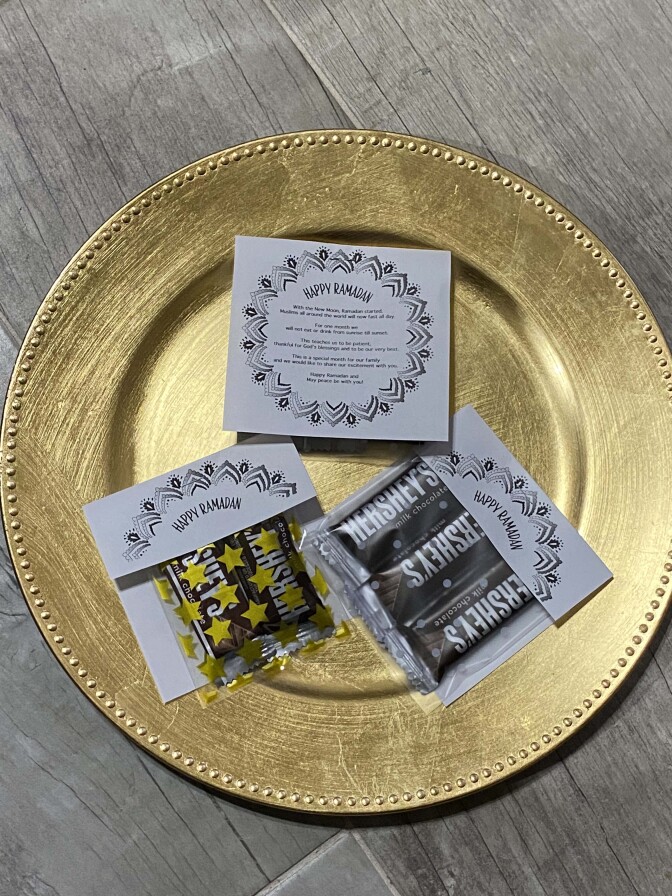How a Family Honors Ramadan at Home and Shares it With Non-Muslim Neighbors | Education
[ad_1]
My elementary school teacher handed me a free lunch ticket because she thought I had forgotten my lunch at home. “Where is your lunch?” the cafeteria monitor asked. I felt all eyes on me and my throat locked. In truth, my 9-year-old mind didn’t know how to explain that I was willingly fasting during the holy month of Ramadan. I didn’t know how to explain that Muslims refrain from all food and drink from sunrise to sunset and that I would have a large meal at sunset. I felt out of place. I felt the tears bubble up. Why was I the only one fasting? Why didn’t my teachers know? More importantly, why couldn’t I explain myself?
Papa was called into the principal’s office for an emergency meeting. He explained to the adults in the room that I needed to fast for the 30 days of Ramadan (the age at which kids start fasting varies). He explained fasting is about staying away from all bad habits. While Muslims make a point of not engaging in things like eavesdropping, stealing, cheating, and more, at all times, we take special care to be even more conscious of our thoughts and actions while fasting. Fasting also teaches us to be patient and stay close to our families.
The adults nodded and smiled as they listened to him. At the end of the meeting, everyone shook hands and laughed about how glad they were that they didn’t have to call social services. I thought Papa would be upset that he had to leave work early, but he wasn’t. He was proud I stood my ground, even if I couldn’t explain myself. He even smiled as we walked back to the car.
When I had children, my family’s second generation in the United States, I decided that I would prepare them for what was coming. I wanted them to be confident in their identity as American Muslims. I wanted to make sure they always felt like this was their home. It’s never easy to be underrepresented because of one’s religion or culture, but people are more aware of the communities surrounding them.
Today, my boys, ages 10 and 8, are proud to fast in the month of Ramadan. They look forward to decorating the house, 30 days of treats, yummy food, going to the masjid (or mosque), making Ramadan cookies, reciting the Quran and learning more about our culture. They are even proud to share Ramadan treats at school. I use this month as an opportunity to teach and nurture their natural curiosity.

Two years ago, our masjids had to close during the holy month of Ramadan due to the pandemic. Even now, access remains limited. However, we listen to spiritual reminders from the masjid, both in person and in live virtual streams. When we sit down to break our fast as a family, we discuss what we heard in the spiritual reminder and talk about something related to Ramadan in our daily life. We try to make special foods and have spiritual discussions to make a significant difference between Ramadan and ordinary days.
As Prophet Muhammad said, “The most beloved action to Allah is when He sees a family has come together to share a meal.”
We discuss the similarities of Islam to other religions, as it helps us understand one another. We talk about how some Christian denominations observe 40 days of fasting and prayer during Lent, and Jewish people fast on Yom Kippur, the Day of Atonement. Even Hindus fast during special seasons. On fasting days, they begin with a ritual bath, a thorough housecleaning and fasting, which can last throughout the day or involve avoiding salt, oil and fried foods. Similarly, many other cultures and religions worldwide practice fasting throughout the year. While the duration, practice and specific reasons differ, everyone has similar goals of empathizing with others and cleansing themselves.
Ramadan is a special month for many reasons, including that the Quran was first revealed to Prophet Muhammad in the last 10 days of Ramadan, called “Nights of Power.” The purpose of fasting in Islam is to develop the quality of righteousness by abstaining from sinful deeds and training ourselves to control our thoughts and desires. It’s a profoundly spiritual practice that benefits us in body, mind and heart. At the end of the 29-30 days of fasting comes a three-day holiday called Eid al-Fitr, when Muslims give to charity, go to morning prayer together, wear new clothes and give gifts or money, called Eidi. We spend the three days visiting family members, sharing meals and celebrating.
In this holy and noble month, every one of our actions can assume become a form of prayer, down to our breathing and sleeping. We take advantage of this opportunity to move toward our goals of being better people of faith.
A big part of celebrating Ramadan involves making food and decorations that entire communities can enjoy. Here are a few printable activities I do with my sons and books families with young children can enjoy during Ramadan.
Ramadan Treat Bag Decorations
These treat bag decorations are perfect for attaching treats to bags of treats filled with things like cookies, candies or even dates, which Muslims usually break their fasts with. Find the instructions and template for the treat bag decorations here.

Tabletop Ramadan Lanterns
Lanterns are a common Ramadan decoration. These are easy to print out and decorate with kids. Step-by-step lanterns instructions and a template for the lanterns are available. You can try decorating them using patterns!

Hanging Ramadan Lanterns
This lantern design includes a handle so the finished lanterns can be hung around the home! Step-by-step hanging lanterns instructions and a template for the hanging lanterns are available.

Ramadan Book Suggestions
[ad_2]
Source link
